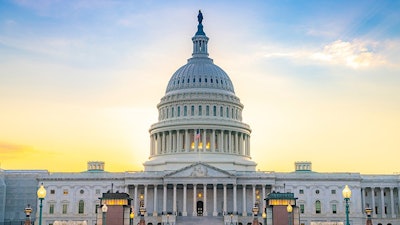
On Nov. 15, a U.S. House subcommittee will hold a hearing on state cannabis laws and federal bipartisan cannabis reforms.
The U.S. House Committee on Oversight and Reform’s Subcommittee on Civil Rights and Civil Liberties will hold the hybrid hearing at 10 a.m. ET.
According to the House Oversight Committee website, Reps. Jamie Raskin, D-Md., and Nancy Mace, R-S.C., will hold the hearing to “examine the many benefits of cannabis decriminalization at the federal level, including addressing racial disparities in the criminal justice system, improving treatment options for veterans, and allowing marijuana companies to access traditional banking services.”
Witnesses will include Amber Littlejohn, senior policy adviser for the Global Alliance for Cannabis Commerce (GACC); Randall Woodfin, mayor of Birmingham, Ala.; Paul Armentano, deputy director of the National Organization for the Reform of Marijuana Laws; Andrew Freedman, executive director of the Coalition for Cannabis Policy, Education, and Regulation; Eric Goepel, founder and CEO of the Veterans Cannabis Coalition; Keeda Haynes, senior legal adviser at Free Hearts; and Jillian Snider, policy director of criminal justice and civil liberties at the R Street Institute.
Cannabis Business Times spoke about the upcoming hearing with Randal John Meyer, J.D., executive director of 501(c)6 cannabis trade organization GACC, and Rezwan Khan, J.D., executive chair and president of GACC, and president of DNA Genetics.
GACC lists three main goals on its website: “Legalize and Regulate Cannabis Commerce Globally,” “Incubate a Vibrant and Competitive Industry” and “Ensure Patient and Adult User Access.”
“As far as GACC, we've shown that we aren't influenced by any company or interest or MSO [multi-state operator], necessarily, but we lean more on the substantive work product that we provide and put pen to paper, come up with solutions, [which], I think, is why we're there," Khan said.
When asked about some of the specific policy positions and recommendations that may be raised in the hearing, Meyer said some Congress members view testimony as a learning experiences in hearings and others grandstand.
“The scope of the hearing is broad, and the scope of the reach for the Oversight Subcommittee on Civil Rights is pretty broad itself,” Meyer said. “And if you look at the committee itself, the membership's pretty diverse.”
Khan said that as a cannabis advocate, it’s important to be open-minded about different pathways to creating change.
“We don't know exactly in the future what changes or amendments could be made to specific text—what could get yanked or added—that essentially provides more hybrid of some of the things that you see currently in discussion, whether it be SAFE, SAFE Plus, MORE, Schumer’s bill, Nancy Mace’s bill,” Khan said. (The bill Sen. Majority Leader Chuck Schumer, D-N.Y., introduced with Sens. Cory Booker, D-N.J., and Ron Wyden, D-Ore., is the Cannabis Administration and Opportunity Act, and Mace’s bill is the States Reform Act.) “There’s forces that are going to pull at certain aspects of those pieces of legislation, to kind of Frankenstein up what actually goes.”
Meyer said the group is open to discussing various topics and approaches to achieving goals for the cannabis industry.
“We support, very expressly, four pieces of legislation as GACC: the MORE Act, the Cannabis Administration and Opportunity Act, the MORE Act, the States Reform Act [SRA] and the SAFE Banking Act," Meyer said. “Those are kind of your big vehicles when you talk about good and perfect calculations for what the industry should be supporting. So, when we look at bills, we don’t necessarily look at the party or those things. We look at the policy questions.”
Meyer said incremental measures, such as SAFE Banking, which has already achieved large bipartisan support, can allow cannabis advocates “to put a foot into the door” with lawmakers.
Channeling Voltaire, Meyer added: “The goal, politically, is never to make the good the enemy of the perfect, but to make sure that there is an intellectual consistency, as well, to how you do that.”
Littlejohn, the witness for GACC, is a licensed attorney and past executive director of the Minority Cannabis Business Association.
“She authored the Minority Cannabis Business Association's social equity report that reported on every state's program,” Meyer said. “So, she's really probably one of the most prominent voices on federal social equity questions."
Khan said the topics of social equity and social justice are integral to any conversation about legalization and advancing the cannabis industry.
“You can't have the conversation with one without the other these days, or the conversation isn't really accepted by all the stakeholders and interested parties,” Khan said. “So, we fully expect them to go straight into a lot of those issues, which again, is another reason why Amber and her background is the absolute perfect representative for this specific hearing, understanding from a policy perspective a lot of, again, that substantive and practical work product we're charting out that we have laid in … model legislation and then again in the SRA.”
“It’s the marriage of those practical considerations with equity, inclusion, small businesses and everything else that we expect to be part of the conversation. That all has to be completely delivered together. Otherwise, you can poke holes in it."
Khan said in the event of federal cannabis legalization, a low federal tax rate would best support cannabis businesses, adding that “we've already had multiple, insulated opportunities to beta that and see what happens with a higher tax rate, and it just doesn't work.”
“Being a business operator, having cultivations and dispensaries and everything else in California, where there's one of the higher tax rates for cannabis in the country, it's crippled the entire industry, to where it's almost imploded,” Khan said.
“And so, from experience, and from a practical consideration, we've decided that a lower federal tax rate is going to help build a sustainable industry and generate tax revenue and actually work, where we believe that the higher tax rate at a federal level slapped on top of whatever the state taxes are, are only going to further cripple the legal market and embolden the black market.”
Interstate commerce is likely to come up in the hearing, Meyer said. “From an interstate commerce perspective, what’s important is understanding that when the federal government legalizes cannabis, it is going to legalize interstate commerce,” he said. “It's going to go through administrative rulemaking on how that commerce is going to come about. And it's important for the cannabis industry to have a deep understanding of how that regulation comes through and what changes and what the impacts are, because that is where the next question of survivability and sustainability for the industry goes to.”
Khan, who wrote an opinion piece titled “Rescheduling Is Recriminalizing, Descheduling Is Decriminalizing” that was published on the CBT site Nov. 10, said GACC expects the hearing to include conversations regarding the possibilities of federal rescheduling or descheduling of cannabis. On Oct. 6, President Joe Biden’ called on Attorney General Merrick Garland and Secretary of Health and Human Services Xavier Becerra to review cannabis’ status under the Controlled Substances Act as a Schedule I drug with no medical use and a high potential for abuse.
“The bottom line is that we've already gotten the executive order to review the scheduling of cannabis—that's already happened,” Khan said. "You can't put the toothpaste back in the tube. Now it's a matter of where that lands and whether or not the decision is made to fully deschedule or to instead reschedule.”
Tune in to the hearing here.

























